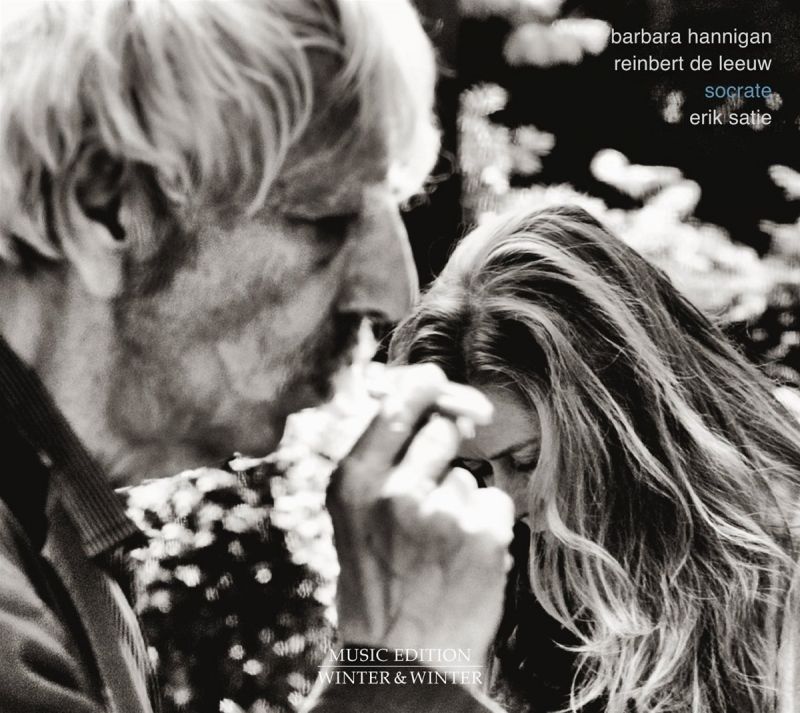SATIE Socrate. Hymne. Trois Melodies
View record and artist detailsRecord and Artist Details
Composer or Director: Erik Satie
Genre:
Vocal
Label: Winter & Winter
Magazine Review Date: 06/2016
Media Format: CD or Download
Media Runtime: 50
Mastering:
DDD
Catalogue Number: 910234-2

Tracks:
| Composition | Artist Credit |
|---|---|
| (3) Mélodies |
Erik Satie, Composer
Barbara Hannigan, Soprano Erik Satie, Composer Reinbert de Leeuw, Piano |
| Autres mélodies |
Erik Satie, Composer
Barbara Hannigan, Soprano Erik Satie, Composer Reinbert de Leeuw, Piano |
| Hymne |
Erik Satie, Composer
Barbara Hannigan, Soprano Erik Satie, Composer Reinbert de Leeuw, Piano |
| Socrate |
Erik Satie, Composer
Barbara Hannigan, Soprano Erik Satie, Composer Reinbert de Leeuw, Piano |
Author: Philip Clark
Throughout their album, Barbara Hannigan and Reinbert de Leeuw maintain a very noticeable consistency of mood, atmosphere and colour. The coolly detached house style of Winter & Winter has been respected but an aesthetic decision has clearly been taken to represent Satie as a creative lone wolf – as an early adopter of theories about harmonic narratives symbolising little apart from the sound of harmony itself which John Cage began to preach during the 1950s, a view that befits a label that has variously immersed itself in the compositional objectivity of Cage, Mauricio Kagel and, most recently, Hans Abrahamsen (and decides to put texts online rather than print them as part of the physical edition).
De Leeuw recorded Trois Mélodies, Trois Autres Mélodies and Hymne with the Dutch soprano Marjanne Kweksilber in 1976 but these new readings speak of Satie’s deep mysteries with extra intensity. The introverted discretion of de Leeuw’s pianism is weighted to perfection during the six Mélodies. As a corrective to that ingrained habit of hairpinning through a rising melodic line, Satie doggedly restates pp in the opening song, ‘Les anges’. And when faithfully realised, as now, the music folds inwards as expressive archetypes are required to function against type.
As with Satie’s notorious Vexations (to which Hymne is closely allied harmonically), once you manage to override Socrate’s apparently faceless surface, all sorts of unforeseeable delights are revealed. Suzanne Danco’s 1937 performance (Darius Milhaud conducting the orchestral version) oozes period charm, it’s true. But Barbara Hannigan, with her flawless enunciation and steadiness of control in the upper register, skilfully removes any hint of operatic grandstanding; and, with de Leeuw skulking in the harmonic shadows, you witness the anonymity of the lines she sings being achieved through ingenious, riddle-like harmonic sidesteps – Satie already teasing with that Cageian ideal of persevering until ‘one discovers that it is not boring at all’.
Explore the world’s largest classical music catalogue on Apple Music Classical.
Included with an Apple Music subscription. Download now.

Gramophone Digital Club
- Digital Edition
- Digital Archive
- Reviews Database
- Events & Offers
From £9.20 / month
Subscribe
Gramophone Club
- Print Edition
- Digital Edition
- Digital Archive
- Reviews Database
- Events & Offers
From £11.45 / month
Subscribe
If you are a library, university or other organisation that would be interested in an institutional subscription to Gramophone please click here for further information.






